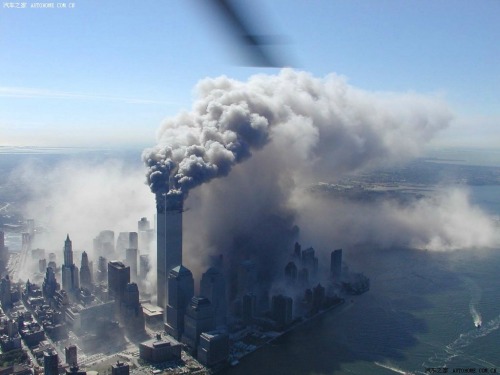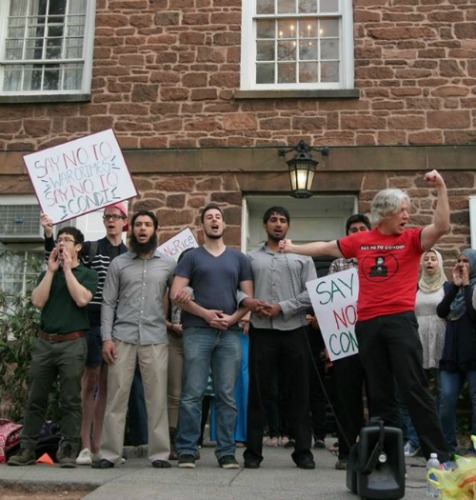At the time of the attacks in Paris, FAIR’s website led with a piece by Ben Norton (11/13/15) about US reporting on the ISIS bombing in Beirut—noting references to the civilian neighborhood targeted by the bombing as a Hezbollah “stronghold” (MSNBC, 11/13/15), “bastion” (Reuters, 11/12/15) or “area” (NPR, 11/12/15). Given this framing—and the generally limited amount of coverage granted to the Lebanese victims—it’s unsurprising that the Beirut terror failed to provoke the same sorrow, horror and identification among US audiences that the Paris massacres did.
Opinion
Charlie Hebdo and Western Liberalism
Islam Has Been Unfairly Criticized and Ridiculed in the West for Centuries.
Politically Incorrect
This is in response to the news article published in the Muslim Link's June 6, 2014 issue, "First Openly Gay Member of VA Assembly is 'Great Friend' of NOVA Muslims."
Ethiopian Muslims: Nothing but Full Freedom!

The trials concerning the members of the Ethiopian Muslims Arbitration Committee, which have been going on for the past two years, will reach its final stage on May 8,, 2015, when the Court will give its final verdict. These heroes went through a court system not expecting to receive a fair trial but to demonstrate to the Ethiopian people and to the world how the Ethiopian court system is not only flawed, but is inherently corrupt in its current form as run by the government security apparatus.
In July 2011, Ethiopian government leaders had insisted that the Ethiopian Islamic Affairs Supreme Council accept members from a sect imported from Lebanon, known as Al-Ahbash, in the upcoming reshuffling of the Council. This sect, having been called a cult for its conformism to the government’s discretion and for its rejection of many fundamental mainstream Islamic teachings, has been the puppet force that the government uses to meddle in Islamic religious affairs. Not only were the new religious leaders appointed by the government, but some of them were active government officials before their appointment to the Islamic Affairs Supreme Council. It is worth noting that the government adopted this forceful method of appointing religious leaders with the country’s dominant Orthodox Church as well at the beginning of the regime’s power.
The Ethiopian constitution of 1995 clearly states the separation of religion and state in Ch. 2 Article 11 Clause 3: “The State shall not interfere in religious affairs; neither shall religion interfere in the affairs of the State.” Despite its constitutional presence, the Ethiopian government continues to deny the rights of Ethiopia’s Muslims to elect their own Council members, thereby blocking an accurate voice to represent the over 40 million-strong community.
The Ethiopian government’s consideration of a threat of homegrown terrorism has been long apparent, but only recently could they find an excuse to enact legislation that would enable it to employ force against its Muslim population, all the while defending its stance in the name of national security. Allegedly as a response to protect its borders from impending terror, the government signed into law the deeply flawed 2009 Anti-Terrorism Proclamation. Since then, it has used the law as a basis in the Courts to criminalize any acts it perceives should be labeled as terrorist or inspiring terror.
The Muslim Arbitration Committee members are among those who went on trial and whose final verdict still awaits due to the implications that this law creates. Because the vague Anti-Terrorism law has such broad provisions, it fails to state exactly what should be categorized as “terrorist acts,” and therefore the government uses it at its own will to jail innocent people who exercise their internationally-recognized right to freedom of speech, peaceful assembly, and association.
Because of the government’s shortcomings, our innocent brothers are suffering at the hands of these oppressors. Imprisoning people simply for exercising their constitutional right of assembling a peaceful demonstration could never be proven justifiable and therefore hints a politically motivated prosecution.
The Ethiopian Muslim community living in the diaspora will not accept any politically motivated decisions except if those result in the full freedom of their leaders. Our peaceful struggle will continue until we fulfill our mission and our demands are wholly addressed. The consequences of any outcomes otherwise shall be the government’s responsibility.
Source: Dimtsachin Yisema Washington D.C. Task Force, First Hijrah Foundation
'Never Forget': Homework on the 9/11 Attacks
My son was told to interview me about what I remember about 9/11. This is what I told him.
Graduating with Heart
Rutgers Students Oppose Choice of Condoleezza Rice as Commencement Speaker












